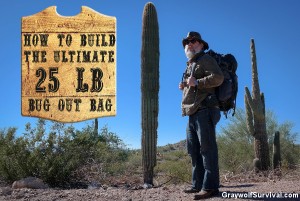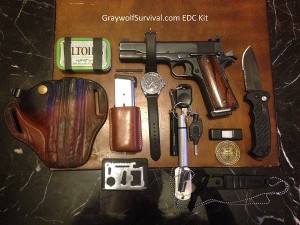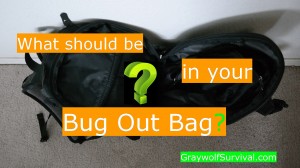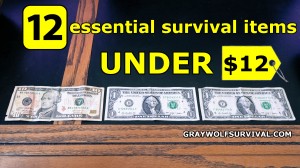 How to barter or negotiate using psychology
How to barter or negotiate using psychology
Want to know how salesmen manipulate you using psychology and how you can turn the table? Bartering is a skill that is not only critical in a SHTF or even TEOTWAWKI scenario, it can help you today. If you learn how to barter (negotiate) now, you’ll not only be better off if the economy collapses or you find yourself in a third-world country, you’ll be able to live more comfortably today with no increase in income. This is the real meaning of the famous quote:
A penny saved is a penny earned
It really bugs the crap out of me when I see that quote used with regards to saving money in a bank, as in stashing it away. That doesn’t even make sense. What it’s saying is that if you have $100 and you buy something for $50 that normally costs $75, then you’ve essentially earned $25 because you can spend it elsewhere.
Bartering is essentially negotiating a deal with something other than common currency so if you learn how to negotiate, you can easily transfer those skills to taking something in exchange for trade. It’s just the specific terms of the negotiation that are a bit more variable when bartering.
I’ve spent a LOT of years learning and practicing psychology with regards to building rapport and getting others to want to do what you need them to do. It also helps that I used to sell cars many, many years ago. Because of this, and because it’s a real-life skill that you can relate to, I’ll use how to buy a car as an example. Plus, you might really want to know how to buy a car and get the best price for it, so this might save you some money in the transaction.
Bartering and negotiating are all about value. It’s not only the value of the goods or services that affect the negotiation, it’s the human value that each party places on the relationship they have with the other person. This is what we’re going to learn about today.
Value is a perception
This is a very fundamental concept that you should get. If someone handed you $100, would that make you happy? What if that $100 were your paycheck for the month because they spent your money elsewhere (like on universal healthcare)? Now you’re not so happy. Why? It’s the same $100 the same person handed to you. It’s because of the perception of what that $100 represents and how you see that it will affect you. It’s the intangable value that you see to that $100 and what the money represents to you that’s different.
To negotiate the best price for a car or barter to leverage your goods or services in the most effective way, you need to somehow get across that your goods / services are more valuable to them than what they are offering. This is also true. No one will ever buy anything, anywhere unless they believe this. What you need to do is leverage this to your benefit. To do that, you need to use psychology.
Negotiation is a power struggle
In the relationship between two individuals who are negotiating, there is always a power struggle. If you have more power than the other person, the part of the negotiating that is due to the value of your relationship will be controlled by you. Let me explain.
If you are negotiating with someone that you are really attracted to or someone you really admire, you’ll cave in much quicker than if you’re negotiating with someone that you don’t like. Why? Because they have more power over you. You care about how they feel regarding the terms of the negotiation. You’ll let this feeling affect the price of what you’ll pay or the amount of goods / services you’ll trade in exchange for what they have. Think girls have to pay more for a car than guys? Wear a sexy outfit to a car lot next time; you’ll see a difference.
Basically, what you will pay for something by bartering what you have or can do is affected by the following:
- What it cost you to get it
- What it would cost you to replace it
- How badly you need what they have
- How much control you have in the relationship
- How much you think they value what you’re trading
- Your communication skills
- What they paid to get what they have
- How badly they need what you have
- How much they think you value what you’re trading
- What it would cost them to replace what they have
They are sitting where you are, just on the other side of the table. Their perceived value is similar regarding what they have to trade.
You can’t do much with regard to what you paid for what you have, because you already have it. Also, what it would cost to replace it isn’t something we can control at the moment (unless you used this psychology to buy what you’re now trading away). We need to focus on what you can control and what you can learn to do, especially using psychology, because that’s what I felt like writing about today. This is what we’re gonna focus on today:
- How much control you have in the relationship
- How much they think you value what you’re trading
- How badly they need what you have
As we said, you need to control the relationship between you and the other person you’re trying to buy or sell from. To do this, you need to do what the Pick-Up community calls, Displaying Higher Value (DHV). Essentially, this means you need to figure out what they respect, admire, or want from another person and show that you have those qualities.
You need to build rapport to negotiate the best price
The easiest way to do this is to build rapport. Make friends with the guy. Ever had a garage sale and some dude walked up and complained rudely that your prices were too high? How’d that work out for his prices? Did you drop your price for him as far as you could have? Probably not. Personally, I would have told the guy something on the order of, “Oh, actually, the prices listed are for my friends. I made the math easy for people like you though, just double what you see for what you can pay.”
On the other hand, if I had a cute college girl that came up to my yard and in our discussion about life and the universe, she happened to casually mention that she may be able to come over this weekend to hang out in my hot tub with a few of her girlfriends, my price is gonna drop faster than a flasher’s pants.
A car salesman is going to take you out on a test drive. He’s not only going to do this to see if the car will work for you (he doesn’t really care about that as long as you buy it) or to prequalify your financial situation to see if he’s wasting his time, he’s trying to get you to fall in love with the car and to fall in love with him. He’s gonna ask about your cats, your family, your job, all that stuff. A good salesman will make this all seem smooth. What he’s doing is called elicitation. He’s also building rapport that will be used later.
You need to do the same thing. Don’t get so wrapped up in the car. They make them every day. You don’t need this one. What you need is to make sure the car is what you need and then work the salesman.
Look at what he’s wearing. Is he wearing a Freemason ring? Does he have anything on that gives you a clue about where he went to college? Does he have an accent? Even if he doesn’t, ask him where it’s from.
Your native language and your locality are two of the basic identifying characteristics that are easily manipulated because if you create a positive association with these, it goes deep into your pscyche. This is why people always ask where you’re from and then instantly associate that place with some aunt who used to live there. It’s a tribal thing that’s still stuck in our brains. It’s part of our deeper identity. I could write a book on using psychology in the art of persuasion but there are already several good ones out there.
Using language to barter in your favor
One of the most powerful tools I use to build rapport is language. I know how to greet and build rapport using about a dozen languages. It’s only a few words, but they are by far the quickest way to build rapport with a person who speaks them natively. Take some time and learn a few words of several languages. If you’re going to be buying something from someone who speaks a different language natively and you know this beforehand, LEARN THEIR LANGUAGE. You don’t have to speak it fluently; far from it.
Here are the top 10 things you need to learn how to say in another language:
- Hello
- How are you?
- Good morning
- Good afternoon
- Good
- Please
- Thank you
- Yes
- No
- Nice to meet you
Man, that would make a nice post in itself.
If you greet someone in their native language and show some respect for their culture (If I’m talking to a guy, I’ll usually mention how hot the girls are from their country and how guys from their country can outdrink most people), you are now part of their family. A quick reminder using just a word or phrase from their language will re-associate you with that deeper psychology and you’re on your way.
Increasing the value of what you have to trade
Obviously, making the guy think what you’re trading is more valuable will get him to come off the price of what he’s trading. In the case of buying a car, what you’re trading is a bank loan. You can’t really increase the value of that without increasing how much you’re gonna pay, which would be stupid. What you need to do is see things from his perspective.
In addition to helping out his new friend who took the time to speak his language and really likes his culture and is the only person who’s ever been interested in his Justin Beiber bobblehead doll collection, he is trying to get paid for selling you the car. His payment is based somewhat on what you pay but only in certain cases. In most cases, a salesman makes a percentage of the profit that the dealership makes after an additional markup.
For example, if they have $10k in a car and he sells it for $11k, then he gets 15% of $1,000 or $150. (I know math makes your head hurt but stick with me). So what happens if he sells it for the bare minimum? This is called a mini-deal. Typically, they’ll make something like $50 or whatever. If you can get the price down to this point, it won’t matter to him what he sells it for because he still makes the $50. In this case, if he sells the car to you for $1333.33, he makes $50 and the same for anything less than that. This is where you should start him wanting to go for because at this point, he’ll sell it to you for $8 if he can because it doesn’t make any difference anymore. He’s now going to be more apt to getting you the best price.
So what else can you work to increase the value of the transaction?
Car salesman also make money from what they call ‘spiffs.‘ These are little bonuses designated by the management to get things out the door. Something like $500 for selling three cars today or an extra $100 bonus for selling the 1968 VW with the dent in the fender. If you can find out what the spiffs are and can work that into a car that will work for you, the salesman will work for you too.
Buying a car on a Sunday or the last day of the month works better because of these spiffs. If he’s about to meet the next tier level of selling 15 cars for the month, which will give him a $1,000 bonus, then the value of your transaction to him is at minimum, $1,050 – no matter what he sells it to you for.
Think that won’t affect how hard he’ll work for you?
As you’re doing all of your research, keep it all in a folder and continue collecting information as you talk to the salesman and look at the cars. You’ll need this data.
Decreasing the value of what they’re selling
Part of the price is based on how much they think you value the car. They have more power in the negotiation if they know you really want it. It’s the same reason you have to stay non-committal when trying to pick up a hot girl. The moment she realizes you really like her, she doesn’t have to try anymore and will move on. Be careful about what questions you ask because they are indicators as to what your hot buttons are (what they will use to display higher value in the car). Also, obviously be careful in your giddiness when you hit the accelerator and don’t bring up anything about what the car reminds you of, such as the old hot rod your uncle Jimmy had before he was committed.
Let them know what you’re looking for so they’ll show it to you but you may want to consider obfuscating (cool word of the day if you don’t already have one) your desires. Mention several things that you are looking for, including things that don’t really matter, and then focus on the ones that meet your needs without letting them know the whole story.
Controlling the negotiation
Once you’ve moved back inside, they’ll pull out a sheet on the car you’re looking at and list out the details. This sheet serves several purposes:
- Reinforces the value of the car by listing out the hot button items you’ve mentioned
- Gets your contact information so they can hit you up again if you bolt
- Gives a tangible item to show the negotiation process
- Gives them something to bring to their “manager” to come back with flourescent markered numbers to show how hard they’re working for you
Be cognizant that this is what they’re doing. Realize that when they list these items that they are trying to control you. The more you see their manipulations, the easier it will be for you to feel comfortable with your own.
They’ll try to get you to commit to something. This gives them a starting point. They’ll usually want you to put your signature down on it. Something to the effect of “I will buy this car today for XXX”. This is where you low-ball. Be careful what you put here because it’ll be hard for you to back out of it without losing face. You should have already done your research beforehand to know what the best price is for the car.
Where you sit is also important. I’ll typically walk into the office and sit down in his chair with a piece of paper and pen. Doesn’t matter what I’m writing, it just gives me an excuse. Now I own his territory. He has to make a choice whether to rudely move you out of the way or sit in the weak position at the other end of the desk. Either way, you win.
When the “manager” comes in, be sure to make your salesman look good with what you say to him. He’ll be more apt to actually helping you (more of the rapport thing). Also realize that in some cases, this is a “floor manager.” A floor manager is sometimes just another salesperson because the real manager is too busy to come down off the tower. Also, you should have been keeping track of what he has said beause sometimes they’ll give up the farm with some comment they made in passing. Remember the folder you’re supposed to be keeping updated?
Keeping your feelings neutral
Buying is an emotional thing, especially buying something you really need or really want. If you’re not careful, you’ll upsell yourself and end up either paying more than you need to or buying something you don’t need at all. Remember that in the psychological techniques above, if you go too far or mess up a little bit, it doesn’t really matter because
YOU DON’T REALLY NEED THIS FREAKING CAR
You may want to even do like I do and decide that you’re not going to buy until a certain day or whatever, no matter what the price is. Think they’re telling the truth when they say this price is only for today or only until you walk out the door? I’ve seen it happen but it’s REALLYY rare. They know that if you walk out, you’ll buy from someone else. Be ready to walk out if the terms aren’t exactly what you want.
Realize that if they let you take the car home, they’re using the puppy-dog close. If you take it home, you’ll get used to having the car and will keep it. Much like you’d do if you brought home a puppy. That’s why they call it a puppy dog close. Because it’s like the puppy. Get it? They’re using this to control you. Realize this and either don’t give into the temptation to bring it home or understand that you’ll probably buy this car if you do.
Also, when they start talking about how big your garage is or where you typically go with the car, they’re trying to manipulate you again. They’re trying to get you to put yourself in the car in your mind so you associate it as yours. Be careful about this guided daydreaming. It’s just another form of control. Don’t worry about the rapport at that point; you can always build it back again next time when they hop up and down, peeing themselves like a puppy the next time you come back with a familiar greeting.
After your decision, don’t burn your bridge
Once you’ve decided to buy something or barter in exchange for some goods or services, make sure you now start hitting the rapport thing hard. Make them realize that this deal was the best deal they’ve ever done. A car salesman won’t have buyer’s remorse after selling you a car (seller’s remorse?) but you need them as leverage for the idiot service department manager who won’t install the spinners on your Jag until next Thursday. Plus, you or one of your friends may need another car someday.
This is even more important when bartering for goods and services in a SHTF or third-world scenario. You need to establish a relationship with the guy. You need his face to light up when he sees you in town. You need him to know that he can finally tell someone about the newest rare Bieber-bobble he just got.












Dude, I sell solar as my living, and on my game I close 80% and i l love that, but you are awesome.
This was published on readynutrition.com on July 24, 2014. Not clear who wrote it or who copied it.
Well, if you go to readynutrution.com’s article, you’ll see that I wrote it. It’s also been on my site since Jan 2013.